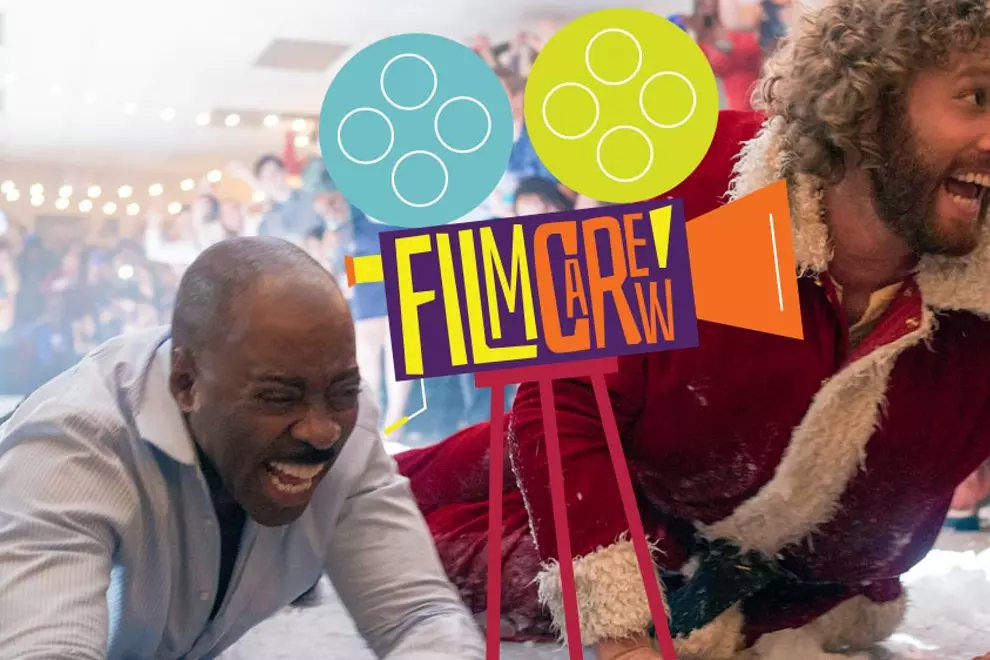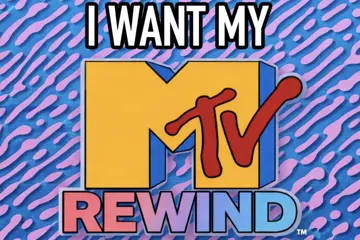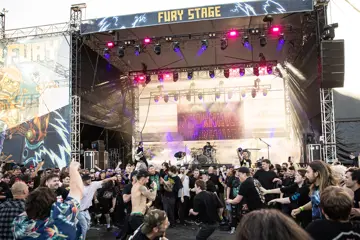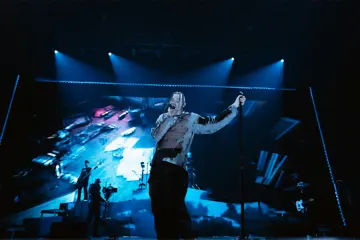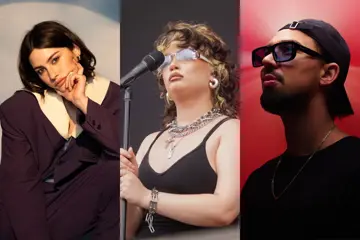OFFICE CHRISTMAS PARTY

Office Christmas Party belongs to a most ’80s-teen-movie tradition: a film in which one wild, out-of-control bash must be thrown in order to save the day. Only, instead of a group of rag-tag misfits coming together to save the arcade/clubhouse/frat/bikini shop from unscrupulous country-club developers, here a wacky workplace-comedy ensemble is out to stage a rager that’ll save… the Chicago branch of a telecommunications conglomerate?
So goes capitalism, I guess; and a speech about the unreasonable need for remorseless growth from Courtney B. Vance even speaks that notion aloud in the text. In the modern-day global marketplace, a second-tier tech company is now considered a borderline mom & pop operation. The biz, here, actually was, but it’s since been handed down to the kids: Jennifer Aniston the ball-busting, remorseless CEO, driven only by stock price; TJ Miller, her Dangerfieldian buffoon of a brother, willed a nepotistic position as local boss by his old man. Aniston wants to cut throats, Miller to give out hugs. They’re the original odd couple!
Beneath them are a vast cast of famous TV-com faces: Jason Bateman the milquetoast manager, Olivia Munn the hot hacker love-interest, Vanessa Bayer an awkward secretary, Karan Soni the office IT weenie, Rob Corddry a permanently-pissed-off salary-man, Kate McKinnon the ever-watchful HR killjoy, Randall Park a humourless office drone, etc. Jillian Bell shows up and steals every scene she’s in as a passive-aggressive pimp, and Fortune Feimster tries out material as an annoying lift-service driver. And if that’s not enough celebrities in the cast, there’s even an extended Jimmy Butler cameo, because, like, Chicago, I guess.
All these famous humans are invited to improv away in comic riffs, the whole ensemble gettin’ loose while pretending to get loose. And if that seems like it’s inviting a lot of cooks into the kitchen, the film itself is a product of committee thinking: directed by two people (Will Speck and Josh Gordon, who once made the Will Ferrell ice-skating comedy Blades Of Glory), written by three (Justin Malen, Laura Solon, Dan Mazer), and with a ‘story by’ three more (Jon Lucas, Scott Moore, Timothy Dowling). This trail of credits is manifest in the film itself, which fires moments of random, oddball humour —and, y’know, fart jokes— in varying directions, but ultimately seems chaotic, and misguided. A firmer hand would be needed to bring together a storyline that grows more ridiculous with each passing act; a sharper satirical edge required to truly stick a film in which a Christmas tragedy is the loss of cellular service, and a Christmas miracle the internet turned back on.
Don't miss a beat with our FREE daily newsletter
Office Christmas Party vaguely evokes the tech world, and cruel capitalist realities, but is never concerned with them. The film ultimately, feels not-particularly concerned with all its perfunctory story beats: Bateman and Munn getting together, Aniston and Miller remembering the importance of family, various office employees getting paired off, a Merry Christmas for all, etc. There’s commitment shown to its central premise: comically contrasting the HR-approved “non-denominational holiday mixer” with pure uninhibited, Dionysian revelry; with the old photocopying-your-ass cliché having nothing on 3D-printing your penis. But, ultimately, even staging the blow-out to end all blow-outs is seen as somehow not enough; with guns and car-chases and near-death-experiences brought in to ‘punch up’ the final act. Office Christmas Party’s titular rumpus may change lives and save jobs, herein, but it can’t save the film itself.
LITTLE MEN

Little Men essentially functions as a companion piece to Ira Sachs’ previous film, 2014’s Love Is Strange. Again, the bond between two males —this time, the titular young adults— is tested by the capitalist cruelty of New York’s real estate market. Here, teenage debutantes Theo Taplitz and Michael Barbieri are loving BFFz from different sides of the gentrification divide: Taplitz’s parents (Greg Kinnear and Jennifer Ehle) inheriting the role of landlords, Barbieri’s Chilean mother (Paulina García of Gloria) their incumbent tenant. When a standoff sets in over an attempt to raise her below-market rent, the film gently tilts into dramatic gear.
Sachs is interested, again, in how the rapacious nature of the rental market undoes simple humanity; Kinner, an actor starring in an off-off-Broadway adaptation of The Seagull, ill-at-ease with having to play the real-estate heavy. But Little Men shines, brightest, as a portrait of two kids on the precipice of adolescence; capturing a transitory time with no coming-of-age clichés. The simplicity of their boyish affections —and their conception of the world— stands in contrast to the complexity of adult realities. “One of the hardest things to realise as a child is that your parents are people, too,” Kinnear says, dispensing wisdom in a moment in which he, otherwise, is losing his shit; Little Men a film about the way children are dragged through the lives of their parents.
MAHANA

22 years after Lee Tamahori brought Once Were Warriors to screen, he’s back, adapting another Witi Ihimaera novel. And you know what that means: enter Temuera Morrison, frame right, as a violent patriarch, ruling over a Maori clan that he, surely, will tear apart with his beatin’ fists. Any comparisons end there, though, as, instead of ‘gritty’ ghetto drama, Mahana is an old-fashioned soap-opera, set in a ’60s Kiwi countryside of men in hats and women in print dresses, lime-green crockery and mint-green school-buses, verdant meadows and abundant sheep. “There are 47 million sheep in New Zealand, and they all need shearing!” yelps a radio commentator in the middle of a sheep-shearing competition that serves as one of Mahana’s moments of ultra-mild suspense.
The synopsis bills it as a rivalry between two Maori shearing families, but it’s really about familial rivalries; about the women who bristle under Morrison’s iron fist, and the young generation that wants to challenge the ways of the old. There’s occasional moments of outright social critique —like a scene in a rural court-house, where a white judge and white lawyers briskly bustle young Maori men, forbidden from speaking in court, through these (scout) halls of justice— but, mostly, it falls back on standard soap-operatics: telegraphed emotions, symbolic storms, black-and-white flashbacks, deathbed speeches, grandstanding gestures; with Morrison eventually, inevitably, due to be deposed from his seat of patriarchal power.

